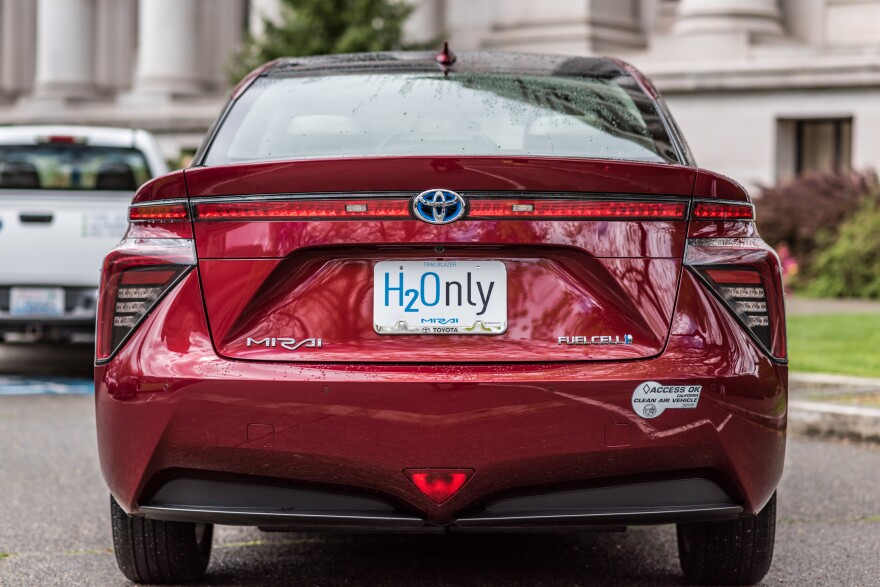Fifteen years ago, the California and British Columbia governments sketched bold plans for a "hydrogen highway" for clean cars stretching from Whistler, B.C., to the Mexican border. California's then-governor Arnold Schwarzenegger drove a Hummer converted to run on hydrogen. Vancouver city officials pictured travelers to the 2010 Winter Olympics leaving only water vapor exhaust in their wake.
But Oregon and Washington state didn't warm to the idea. There are still no public fueling stations for hydrogen cars in either state. (Schwarzenegger replaced his hydrogen-fueled Hummer with an electric Mercedes-Benz SUV in 2017.)
Today, automakers Toyota, Honda, Hyundai and Mercedes make hydrogen fuel cell electric cars in very limited numbers. None of their Pacific Northwest dealers currently stock or sell those models to local drivers. Nevertheless, Toyota is laying the groundwork to bring its hydrogen-powered vehicles to the Northwest.
In Olympia Wednesday, La Stanja Baker, Toyota's regional government affairs director, offered Washington Gov. Jay Inslee and interested state lawmakers test drives in Toyota's hydrogen-powered Mirai sedan. Before they drove off, Baker told Inslee that hydrogen refueling stations are a precondition to begin sales.
"The fueling stations, at least initially we think to get the market started there needs to be — as we've experienced in California — probably a public-private partnership," Baker said.
In a later interview, Inslee said he would not rule out alternative fuel incentives or start-up subsidizes down the road. He said he had been thinking about emissions-free, hydrogen-powered transportation "for a long time" as part of drawing on all available strategies to reduce global warming pollution. Combating climate change is the central focus of Inslee's campaign for the 2020 Democratic presidential nomination.
Toyota offered test drives in Salem in the hydrogen-powered Mirai to Oregon lawmakers earlier this year. Any incentives legislators cook up wouldn't be on the table until next year at the earliest because the deadline to introduce new bills in the 2019 sessions in Olympia and Salem has passed.
Isn't the future electric?
Much consumer and policymaker attention has focused on battery-electric vehicles as the likely automotive technology of the future. Dave Bora, Toyota North America's Portland-based senior manager for advanced technology research, said his company is planning on providing multiple options: hybrid vehicles, plug-in hybrids, fully electric and hydrogen fuel cell cars.
"Why we're here is educating the key decision makers to see if they could help support some of the infrastructure," Bora said in an interview beside the demonstration car. "Obviously if you bring the [hydrogen] cars here and there are no stations to refuel them, they'll get 300 miles and then... pfftt."
A hydrogen fuel cell doesn't burn anything. It uses a chemical reaction between the hydrogen fuel and oxygen from the air to produce electricity. Hydrogen fuel cell cars are quiet, like battery electric ones, and they emit only water out the exhaust.

The 2019 Toyota Mirai is sold only in California and Hawaii to customers who live near a fueling station. The four-seater is quite expensive for a sedan of its size at a base price around $58,500. The hydrogen-powered 2019 Honda Clarity Fuel Cell sedan is available only for lease and only to Californians who live or work near a fueling station.
Baker said one of the advantages of a hydrogen fuel cell vehicle over fully electric competitors is faster refueling.
"You can fuel it in two to five minutes and be on the road," Baker said. "You don't have to sit at a charger. You don't have to wait for somebody to release a charger so you can get to it."
She said eco-minded apartment dwellers who don't have a place to charge an electric car might be attracted to hydrogen cars.
"Or if you live in an older home that would need to be [electrically] retrofitted, any of those things," Baker continued. "If you can go to a central fueling station it makes things easier."
Northwest-made hydrogen
Looking on at the Toyota demonstration Wednesday were utility officials from Douglas County PUD, the owner and operator of Wells Dam on the Columbia River. The electric utility based in East Wenatchee, Washington, is actively exploring whether to buy industrial equipment to make hydrogen through electrolysis of water. The utility would produce "renewable hydrogen" when Wells Dam generates surplus electricity, such as during spring runoff.
"We're interested, very excited about it," said PUD Commissioner Ron Skagen. "We think there are markets for our hydrogen. So we can probably sell the product even before we are really committed to it."
Skagen and fellow commissioner Molly Simpson said hydrogen produced by a $2 million-$5 million demonstration-scale electrolyzer could be sold as a clean transportation fuel or for use in industrial processes such as making fertilizer. A commission vote to proceed with facility construction could come next year after further analysis of costs and benefits.
Shortly before his test drive, Inslee signed into law a bill which grants public utility districts statewide the authority to branch into hydrogen production and wholesaling. Douglas County PUD requested the legislation, which was carried by state Senator Brad Hawkins (R-East Wenatchee).
The bill signing provided the excuse for Toyota to return to Olympia for the second time this year with the hydrogen-powered Mirai sedan. The automaker has also displayed the vehicle in the past year in Seattle at a CleanTech Innovation Showcase and multiple times in Portland at an annual alternative fuel vehicle conference put on by the nonprofit Forth Mobility.
Meanwhile, in British Columbia, the Hydrogen Technology & Energy Corporation is slowly building a taxpayer-subsidized, six-station retail refueling network in the greater Vancouver and Victoria regions. There is currently one station open in Vancouver and one under construction in suburban Burnaby. Hydrogen fuel pumps are being co-located at Shell stations or 7-Eleven convenience stores according to HTEC.
The B.C. government announced last year that by 2040, it wants new cars and light trucks to be zero-emissions to be allowed for sale or lease in the province.


